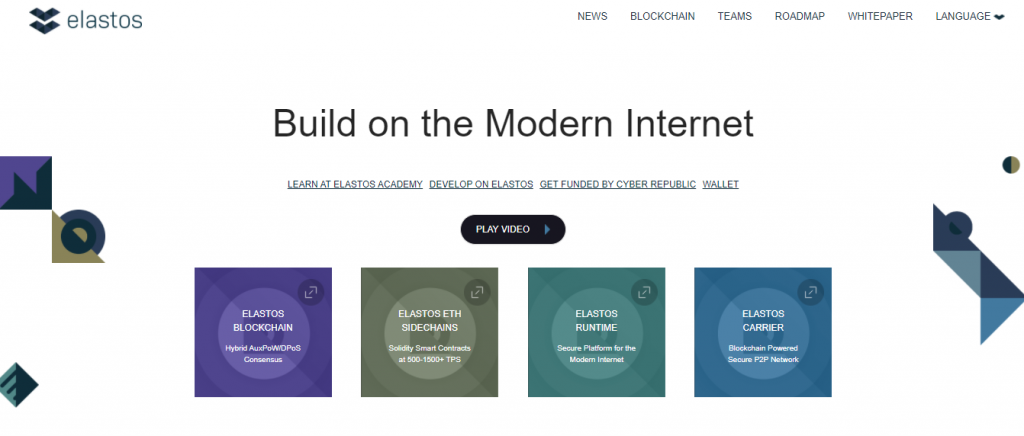Elastos
(ela)
Not AvailableMarket Data For elastos
| Current Price | $11.70 |
| Market Cap | - |
| Market Cap Rank | - |
| Total Volume | - |
| High 24H | - |
| Low 24H | - |
| Price Change 24H | - |
| Price Change Percentage 24H | - |
| Market Cap Change 24H | - |
| Market Cap Change Percentage 24H | - |
| Circulating Supply | - |
| Total Supply | - |
| All Time High | - |
| All Time Low | - |
Mining Pools For elastos
| Pool | Location | Fee | Rating |
|---|---|---|---|
| MINING POOL HUB | Reviews & Features | EUROPE,USA,ASIA | 0.9% PPLNS | 2 |
Coin Data For elastos
About elastos
Elastos Review: Mining Guide, Price & Analysis of Elastos Cryptocurrency
Elastos is a blockchain project that seeks to revolutionize the Internet. The goal is to have a network that offers users decentralized web services. Exchange of data is peer to peer. This means that there is no need for a centralized institution to run servers.
To do this, Elastos integrates blockchain technology with traditional Internet services. This produces a new structure for the Internet. Here, people will own their digital work. Consequently, they can generate wealth from their work.
Currently, content creators rely on central institutions for distribution. Therefore, they do not own their digital work. However, the company gives content creators ownership of their work of art. It helps create a platform where users can trust each other. This is because everything is transparent in this network.
The Elastos project offers a lot of social and economic incentives. It is easy to see the cryptocurrency community get behind it. Moreover, the governance of this platform is community-based. Let’s see how it works.
How Elastos Works
Elastos assumes a main chain sidechain structure. The sidechains host decentralized applications. Users can access these DApps on their operating systems. Then, the mainchain hosts the communication of all sidechains.
To allow communication, Elastos uses a Simplified Payment Verification mechanism. Here, the sidechain implements the SPV module of the mainchain. This allows the sidechain to achieve synchronization with the mainchain. Therefore, the sidechain can easily confirm the main chain block and all transfers.

Further, the main chain’s arbitrators powers all transactions. The arbitrators have different roles depending on the direction of the transaction. When moving from the mainchain to the sidechain, the arbitrator only facilitates the transaction. However, when the transaction is from the sidechain, the arbitrator must sign the transaction.
The arbitrators allow the main chain to confirm transactions. Users can vote on who gets to be an arbitrator. The arbitrators regularly rotate to achieve equality. Additionally, the arbitrators need to have enough computing power to manage the workload. Arbitrators receive rewards from transaction fees.
Further, Elastos uses smart contracts. This gives it more versatility. It allows developers to build and launch their decentralized applications. It is a direct competitor of the Ethereum blockchain. However, Ethereum is better-established. It is impossible to tell whether this cryptocurrency can dethrone a big player like Ethereum.
Can Investors Mine Elastos Coins?
Yes, it is possible to mine Elastos coins. The platform uses a Proof of Work consensus that supports merged mining. Merge mining is the process of mining two different cryptocurrencies at the same time. In this case, Elastos supports merged mining alongside Bitcoin.
This comes with a lot of benefits. Here, Bitcoin is the better-established blockchain. Hence, the platform can use some of its hash power in its consensus process. Consequently, this adds another layer of security to the network.
The arbitrators act as miners. They package transactions and generate the mining transaction on the mainchain. Then any full nodes on the sidechain can validate blocks on the network.
This process comes with many benefits. For starters, it helps prevent the centralization of mining power. Consequently, it prevents 51% attacks on the network. Additionally, the process does not require heavy computational power.
The Team behind Elastos
Elastos has a great team behind it. The founder and CEO of Elastos is Rong Chen. He has excellent experience in software engineering. Previously, Rong Chen worked at Kortide. Here, he served as the Chairman and CEO. Additionally, he was a Senior Software Engineer at Microsoft for over seven years.
By his side is Feng Han. He is the co-founder. Feng has tons of experience as a lecturer of AP Physics. Additionally, he is the founder of the MIT IDE Blockchain Pillar and Education.
These individuals have great experience to spearhead any blockchain project. Therefore, it is safe to say that Elastos is in great hands. Moreover, there are more team members with vast experience in diverse areas. The entity also has great advisors and partners.
Elastos Coin Performance
The Elastos coin powers transactions on the Elastos network. It currently holds the 325th position in market cap share. This is good but not that great. The coin has over three years in the market. We expect it to do better in the markets. However, it is easy to see why Elastos does not see excellent performance in the market.
Elastos is competing with centralized tech companies that are better-established and better-funded. The team at Elastos needs to help the public understand the merits of such a project. Only then will it see better adoption.
The company currently has a market cap of $26,376,421. Additionally, it has a 24-hour trading volume of $1,713,472. This shows that the coin has a lot of potential to grow.
Privacy and Security
Elastos has excellent security features. Both Elastos DApps and Elastos smart contracts run on the Elastos Smart Web. This results in a closed environment that attackers cannot penetrate. This implementation design is more secure since no transactions happen off-chain. Additionally, it is faster.
Further, Elastos prevents interaction with TCP/IP. Instead, the system is responsible for finding data in remote locations. It then provides a response to the users. This prevents malicious activity on the application or remote service.

Moreover, Elastos gains another layer of security from merge mining. This is because it takes advantage of the hashing power of Bitcoin. This makes it computationally expensive to attack the network.
Further, the network utilizes smart contracts. These add a layer of security to transactions.
Our Take on Elastos
Elastos has a great mission behind it. The project presents a lot of social and economic incentives. The company completely removes the need for central institutions on the Internet. This means that users have total control over all resources and applications. This is the initial intended form of the Internet.
However, Elastos does not have great adoption in the community. It faces stiff competition from centralized institutions with better funding. Moreover, such institutions have well over ten years in the markets. It is hard to see how the coin will dethrone them. The only possibility we see is Elastos gaining slow traction over a long time.
Advantages
- The platform offers decentralized Internet services.
- It is secure and fast.
- It has decentralized governance.
Disadvantages
- The coin faces stiff competition from better-established central institutions.
How to Buy this Coins
If you like what you see with Elastos, then you can buy it coins. There are several exchanges that you can purchase this coin from. These include Huobi Global, BitZ, Poloniex, CoinEgg, KuCoin, and LBank. At the time of writing this, one coin costs $1.53.
The total supply of Elastos is 23,084,774 ELA, and the circulating supply is 17,244,540 ELA. This means that this coin has the potential to grow in value with more adoption. Therefore, you may want to hold this coin and sell it at a later date. You can store your coins in the proprietary Elastos wallet. It is available on Android, iOS, and there is a web-based version.
Final Verdict
Elastos offers great prospects. Elastos implements a decentralized Internet architecture. This is the original vision of the Internet. It is easy to see this project get more people behind it. However, stiff competition from centralized institutions is a problem. It may stunt the adoption of the platform.
Nonetheless, this project has the potential to grow. The team of this company only needs to help the public understand its merits.
 $97,172.00
$97,172.00
 $3,109.04
$3,109.04
 $1,528.07
$1,528.07
 $2,389.10
$2,389.10
 $609.61
$609.61
 $516.49
$516.49
 $294.43
$294.43
 $161.98
$161.98
 $88.85
$88.85
 $157.97
$157.97
 $86.66
$86.66
 $74.47
$74.47
 $76.21
$76.21
